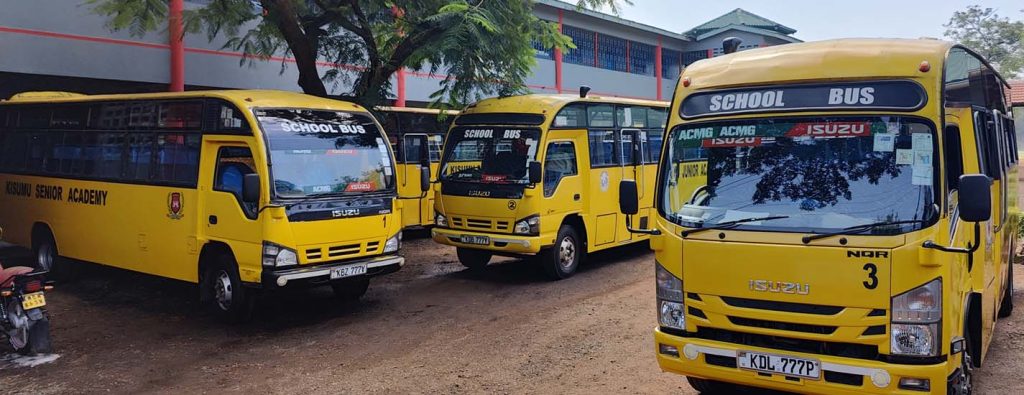In Kenya, the safety of schoolchildren during transportation is a critical concern, with the National Transport and Safety Authority (NTSA) enforcing stringent regulations to ensure compliance. The NTSA School Vehicle Road Licence is a mandatory requirement for any vehicle used to transport students, ensuring that it meets safety and operational standards. This comprehensive guide details the requirements, application process, and compliance obligations for obtaining and maintaining the NTSA School Vehicle Road Licence in 2025, offering clarity for transport providers, school administrators, and parents.
The Importance of the NTSA School Vehicle Road Licence
The NTSA School Vehicle Road Licence is a legal prerequisite for any vehicle used to transport schoolchildren in Kenya. It ensures that vehicles meet safety standards, are operated by licensed providers, and comply with national regulations. According to the NTSA (Operation of Public Service Vehicles) Regulations, each school vehicle must have its own valid road licence, distinct from the School Transport Providers Licence, to operate legally. Non-compliance can result in penalties, including fines, vehicle impoundment, or licence suspension, making adherence critical for operators.
Key Benefits of the Licence
- Student Safety: Ensures vehicles are equipped with safety features like seat belts and speed governors.
- Regulatory Compliance: Aligns operators with NTSA standards, avoiding legal repercussions.
- Parental Confidence: Builds trust among parents and schools by ensuring safe transport.
- Accountability: Allows NTSA to monitor and regulate school transport operations effectively.
Legal Framework for the NTSA School Vehicle Road Licence
The NTSA School Vehicle Road Licence is governed by the National Transport and Safety Authority Act, 2012, and related regulations. These laws outline the requirements for school vehicles, emphasizing safety, inspections, and compliance. Key provisions include:
- Submission of a valid School Transport Providers Licence.
- Provision of a recent vehicle inspection certificate.
- Payment of fees as per the First Schedule.
- Conditions for suspension, revocation, and alternative use of school vehicles.
Detailed Requirements for the NTSA School Vehicle Road Licence
To obtain an NTSA School Vehicle Road Licence in 2025, applicants must meet specific criteria and submit required documentation. Below is a detailed breakdown of the requirements:
1. Valid School Transport Providers Licence
- Applicants must provide a copy of a valid School Transport Providers Licence in the name of the applicant.
- This licence, issued by the NTSA, confirms that the operator is authorized to provide school transport services.
- The School Transport Providers Licence must be current and renewed annually, as it is a prerequisite for the vehicle-specific road licence.
2. Valid Vehicle Inspection Certificate
- A vehicle inspection certificate, issued no more than 30 days before the application date, is mandatory.
- The certificate verifies that the vehicle meets NTSA safety standards, including:
- Functional seat belts for all passengers.
- Installed speed governors limiting speed to 50 km/h.
- Yellow band markings and school transport signage.
- Fire extinguishers, first-aid kits, and other emergency equipment.
- Inspections must be conducted at NTSA-approved centers, ensuring roadworthiness.
3. Payment of Prescribed Fees
- Applicants must pay the fees outlined in the First Schedule of the NTSA regulations.
- Fees vary based on vehicle type and capacity, with details available on the NTSA website (www.ntsa.go.ke) or at regional offices.
- Payment is typically made through the NTSA’s TIMs portal.
4. Validity and Renewal
- The NTSA School Vehicle Road Licence is valid for one year from the date of issue.
- Operators must renew the licence annually, submitting updated documentation and fees.
- Renewal ensures continuous compliance with safety standards and prevents operational disruptions.
5. Conditions for Suspension or Revocation
- The NTSA may suspend or revoke the School Vehicle Road Licence if operators breach regulations, such as:
- Operating an unroadworthy vehicle.
- Failing to maintain safety features.
- Using the vehicle for unauthorized purposes without proper licensing.
- Before suspension or revocation, the NTSA must:
- Provide written reasons for the proposed action.
- Offer the licence holder an opportunity to make a representation.
- Consider the representation before finalizing the decision.
6. Private Use of School Transport Vehicles
- If a school vehicle is used for non-school purposes (e.g., hiring or transporting non-students), operators must apply for a short-term road service licence from the NTSA.
- This ensures compliance with regulations for public service vehicles (PSVs) and prevents misuse of school vehicles.
Application Process for the NTSA School Vehicle Road Licence
The application process for the NTSA School Vehicle Road Licence is designed to be efficient, leveraging the NTSA’s Transport Integrated Management System (TIMs) portal. Below is a step-by-step guide for 2025:
Step 1: Verify School Transport Providers Licence
- Ensure that the applicant holds a valid School Transport Providers Licence.
- Check the licence’s expiry date and renew if necessary before applying for the vehicle road licence.
Step 2: Conduct Vehicle Inspection
- Schedule an inspection at an NTSA-approved center within 30 days of the application.
- Ensure the vehicle complies with safety requirements, such as speed governors, seat belts, and signage.
Step 3: Register or Log In to the TIMs Portal
- Access the NTSA TIMs portal (www.ntsa.go.ke) and log in or create an account.
- Provide accurate details about the operator and vehicle, including registration number and ownership details.
Step 4: Submit Application
- Upload the required documents, including:
- Copy of the School Transport Providers Licence.
- Valid vehicle inspection certificate.
- Complete the application form, specifying vehicle details and intended use.
- Pay the prescribed fee via the portal’s payment system.
Step 5: Licence Issuance
- Upon verification, the NTSA issues the School Vehicle Road Licence within 7–14 working days.
- The licence can be downloaded from the TIMs portal or collected at an NTSA office.
Step 6: Annual Renewal
- Monitor the licence’s expiry date and initiate renewal at least 30 days prior.
- Submit updated inspection certificates and fees to maintain compliance.
Compliance Obligations for School Vehicle Operators
Beyond obtaining the licence, operators must adhere to ongoing compliance requirements to ensure safe and legal operations:
- Regular Vehicle Maintenance: Conduct routine checks to maintain roadworthiness, including brakes, tires, and safety equipment.
- Driver Training: Ensure drivers hold valid PSV licences and receive training on child safety and emergency procedures.
- Insurance Coverage: Maintain comprehensive insurance for passengers and the vehicle, as required by Kenyan law.
- Route Adherence: Operate within designated routes and schedules to prevent overcrowding or unsafe practices.
- Safety Features: Continuously maintain seat belts, speed governors, and signage, with regular NTSA inspections.
Non-compliance, such as operating without a valid inspection certificate, can lead to penalties or vehicle impoundment, as seen in NTSA enforcement actions reported in 2025.
Challenges in Obtaining and Maintaining the Licence
School transport operators in Kenya face several challenges in meeting NTSA requirements:
- High Costs: Vehicle modifications (e.g., speed governors, seat belts) and inspection fees can strain small operators.
- Inspection Delays: Limited availability of NTSA-approved inspection centers, particularly in rural areas, can cause delays.
- Regulatory Complexity: Navigating the TIMs portal and understanding requirements can be challenging for new operators.
- Corruption Concerns: Allegations of bribery within the NTSA, as reported in 2024, raise questions about transparency in licensing processes.
To mitigate these challenges, the NTSA has expanded its digital services and regional offices, encouraging operators to use the TIMs portal for faster processing.
The Role of Schools and Parents in Ensuring Compliance
Schools and parents are vital stakeholders in ensuring that school vehicles meet NTSA standards:
- Schools Should:
- Verify that transport providers and their vehicles hold valid NTSA licences.
- Conduct regular safety audits of contracted vehicles.
- Educate parents about the importance of licensed transport services.
- Parents Should:
- Request proof of the School Vehicle Road Licence from schools or operators.
- Report non-compliant vehicles to the NTSA via the toll-free line (0709 932 000) or TIMs portal.
- Advocate for enhanced safety measures, such as real-time tracking of school buses.
Emerging Trends in School Transport Regulation
As Kenya advances its transport and education sectors, the NTSA is likely to introduce innovative regulations to enhance school vehicle safety:
- Technology Integration: GPS tracking and telematics to monitor vehicle speed and routes in real time.
- Enhanced Driver Training: Mandatory programs focusing on child safety and defensive driving.
- Eco-Friendly Vehicles: Incentives for adopting electric or hybrid school buses to reduce costs and emissions.
- Public Awareness: Campaigns to educate stakeholders about NTSA regulations, as proposed by youth leaders in 2025.
The NTSA School Vehicle Road Licence is a critical tool in ensuring the safety and reliability of school transport in Kenya. By meeting requirements such as a valid School Transport Providers Licence, recent vehicle inspection certificates, and prescribed fees, operators can contribute to a safer transport ecosystem for students. Despite challenges like high costs and regulatory complexities, the NTSA’s digital platforms and enforcement measures aim to streamline compliance.
For schools, parents, and operators, prioritizing the NTSA School Vehicle Road Licence is not just a regulatory necessity but a commitment to protecting Kenya’s children. By staying informed and proactive, stakeholders can ensure that school transport in 2025 meets the highest standards of safety and accountability.
For more details or to apply for the NTSA School Vehicle Road Licence, visit www.ntsa.go.ke or contact an NTSA regional office.





